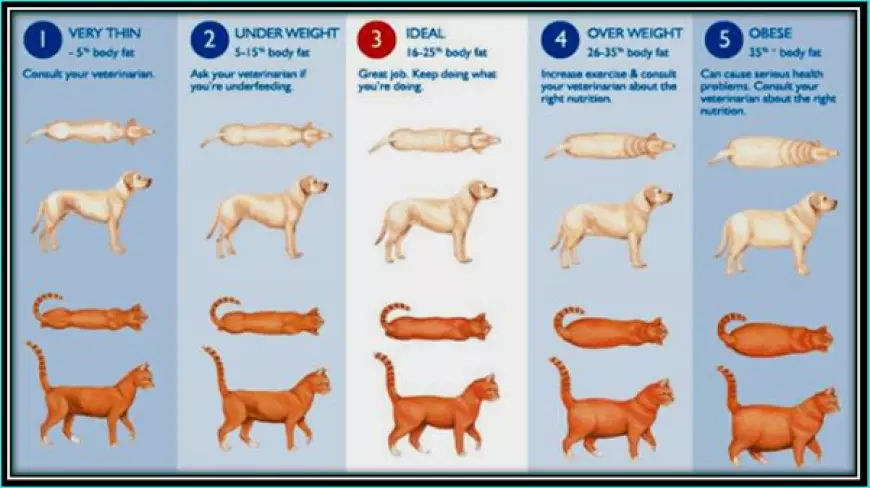How Can I Tell If My Dog Is Overweight?
Is your furry companion carrying too much weight? Discover the key indicators of dog obesity and get helpful advice on maintaining a healthy lifestyle for them.

Understanding the importance of maintaining a healthy weight for your dog.
Maintaining a healthy weight is crucial for the overall well-being of your furry friend. Just like humans, excess weight can lead to a plethora of health issues in dogs, such as diabetes, heart disease, and joint problems. It's not just about appearance; it's about ensuring their quality of life.
When assessing your dog's weight, there are a few key factors to consider beyond just the number on the scale. One important aspect is body composition – muscle mass versus fat. It's essential to focus on building lean muscle through regular exercise and a balanced diet rather than simply shedding pounds. Additionally, different breeds have varying ideal weights and body structures, so it’s important to consult with your veterinarian or use breed-specific guidelines for an accurate assessment.
Keeping our beloved pets within a healthy weight range also benefits their mental and emotional well-being. An overweight dog might struggle with mobility and experience discomfort during daily activities like walking or playing fetch. By maintaining a healthy weight, we enhance their physical abilities and contribute to a happier and more active lifestyle. Remember that our furry friends rely on us for their nutrition needs, so let’s make sure we provide them with all the tools they need for optimal health!
Visual cues: Identifying signs of excess weight.
Visual cues can be a helpful indicator when trying to determine if your dog is carrying excess weight. One of the most obvious signs is a lack of waistline. Instead of an hourglass figure, overweight dogs may appear round or barrel-shaped. Additionally, you should be able to feel your dog's ribs with minimal pressure. If you can't easily detect them, it could mean that your furry friend has some extra pounds.
Another visual cue to look out for is the presence of fat deposits around the neck and shoulders. An overweight dog may have thickened skin and visible folds in these areas. In addition, check the belly area - an excessive layer of fat could create sagging skin or a sway when walking or running. By paying attention to these visual cues, you can take steps towards addressing any excess weight and ensuring your dog's overall health and well-being.
Remember that while visual cues are useful, they are not always definitive proof of excess weight. It is essential to consult with a veterinarian who will assess your dog's body condition accurately through physical examinations and maybe even recommend dietary adjustments or exercise regimens tailored specifically for your pet's needs.
Body condition scoring: A more objective assessment.
When it comes to assessing a dog's weight, many pet owners rely on their own subjective judgement. But did you know that there is a more objective way to determine if your furry friend is overweight? Body condition scoring (BCS) is a tool used by veterinarians that takes into account factors such as the presence of excess fat and muscle condition. By using this method, an accurate assessment can be made which provides important information about a dog's overall health.
One of the benefits of body condition scoring is that it provides a standardized scale for evaluating dogs of all shapes and sizes. Unlike simply relying on visual cues, BCS takes into account specific anatomical markers such as ribs and hip bones, allowing for a more precise evaluation. This eliminates potential bias from pet owners who may have difficulty distinguishing between cute chubbiness and unhealthy weight gain.
Furthermore, body condition scoring can help identify potential health issues before they become serious problems. Dogs that are overweight or obese are at higher risk for conditions such as diabetes, joint problems, and heart disease. By regularly assessing your dog's body condition score, you can take proactive steps towards ensuring their long-term well-being.
In conclusion, while it may be tempting to rely on subjective judgements when determining if your dog is overweight, using body condition scoring offers numerous advantages in terms of accuracy and objectivity.

Health risks: Potential consequences of canine obesity.
One of the most important reasons to keep your dog at a healthy weight is to prevent potential long-term health risks. Canine obesity is not just about appearances; it can have serious consequences for your furry friend's overall well-being. Excess weight puts additional strain on your dog's joints, making them more prone to conditions such as arthritis and joint pain. This can greatly limit their mobility and quality of life.
Another major concern associated with canine obesity is an increased risk of developing various heart diseases. Just like in humans, excess body fat can lead to high blood pressure and elevated cholesterol levels in dogs. These factors put a strain on the heart and can eventually lead to heart failure if not properly managed. Keeping your dog at a healthy weight through proper diet and exercise can help protect their cardiovascular health in the long run.
In addition, overweight dogs are more susceptible to respiratory problems such as shortness of breath and difficulty breathing during physical activities or even basic daily routines. The extra weight puts pressure on their chest cavity, making it harder for them to expand their lungs fully. This not only interferes with their ability to exercise comfortably but also increases the risk of developing other respiratory issues over time.
By keeping a close eye on your dog's weight and taking proactive measures to ensure they maintain a healthy body condition, you'll be helping them avoid these potentially serious health consequences.
Diet and exercise: Strategies for managing weight.
In addition to monitoring your dog's weight through physical indicators, diet and exercise play a crucial role in managing their overall health. When it comes to weight management, it's important to find the right balance between calorie intake and calorie expenditure. One effective strategy is portion control – ensuring that your dog is consuming an appropriate amount of food for their size and activity level. Measuring meals with a kitchen scale or consulting with a veterinarian can help you determine the correct portion sizes.
Moreover, the quality of the food you feed your dog can significantly impact their weight. Opting for high-quality, balanced diets that are rich in lean proteins and low in carbohydrates can help support weight management goals. Additionally, consider incorporating healthier treats into their diet or using interactive toys that require physical activity to access rewards. Small changes such as these can make a big difference in managing your dog's weight.
When it comes to exercise, finding activities that both you and your pup enjoy can be beneficial for maintaining a healthy weight. Regular walks or jogs not only promote physical fitness but also strengthen the bond between you and your furry companion. Engaging in interactive play sessions using toys like frisbees or balls allows them to burn calories while having fun. Remember that consistency is key – aim for at least 30 minutes of exercise each day to keep them active and help manage their weight effectively.
Consultation with a veterinarian: Seeking professional advice.
Consultation with a veterinarian is an invaluable step when it comes to seeking professional advice about your dog's weight. Veterinarians have extensive knowledge and experience in animal health and can provide guidance tailored specifically to your dog's needs. Their expertise goes beyond basic weight guidelines, as they take into consideration factors like breed, age, activity level, and overall health. By consulting with a veterinarian, you can gain insight on the ideal weight range for your furry friend and receive practical tips on nutrition, exercise, and portion control.
Moreover, veterinarians can perform a thorough physical examination to assess your dog's overall health and identify any underlying conditions that might be contributing to weight gain or obesity. These professionals are trained to evaluate body condition scores which involve assessing fat distribution and muscle tone across different areas of the body. They may also use special tools like weighing scales designed for pets to accurately measure your dog's weight. This detailed evaluation helps determine if there are any medical concerns that need addressing along with providing you peace of mind that you're making informed decisions about your pet's well-being.
In conclusion, consulting with a veterinarian brings professional expertise to the table when it comes to navigating your dog's weight management journey. Their guidance ensures that you adopt a holistic approach towards maintaining your furry companion’s optimal weight while considering their specific needs. Remember, every pet is unique and has individual requirements; therefore professional advice from a qualified vet is crucial in ensuring your beloved canine stays fit and healthy throughout their life.
Conclusion: Prioritizing your dog's well-being through weight management.
In conclusion, prioritizing your dog's well-being through weight management is essential for their overall health and happiness. Just like humans, dogs can experience a myriad of health issues if they are overweight or obese. From joint problems to heart disease, excess weight can take a toll on your furry friend's quality of life.
By taking the time to monitor your dog's weight and make necessary adjustments to their diet and exercise routine, you are investing in their long-term health. It is important to remember that weight management goes beyond simply controlling how much food they consume. Regular exercise, mental stimulation, and ensuring they receive a balanced diet are all key factors in maintaining a healthy weight for your pup.
With the proper knowledge and commitment, you have the power to make a positive impact on your dog's well-being. By consulting with your veterinarian and implementing an appropriate weight management plan tailored specifically for your pet, you can help them live a longer, happier life free from the burden of excess pounds. Remember, every small step toward better weight management counts - whether it be going for an extra walk each day or incorporating more playtime into their routine.







